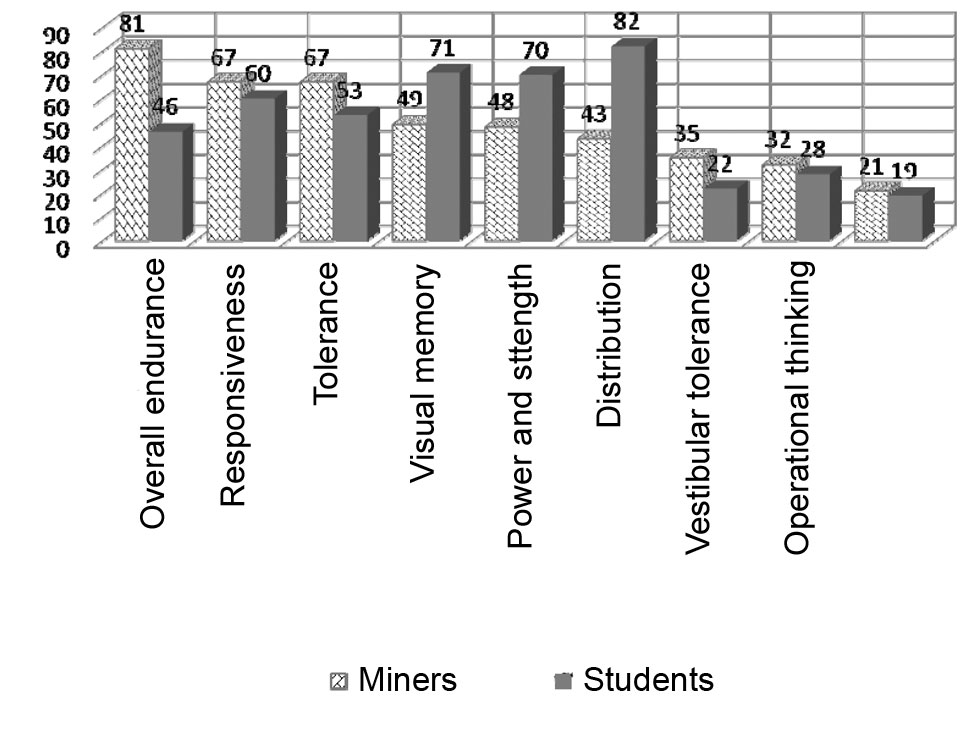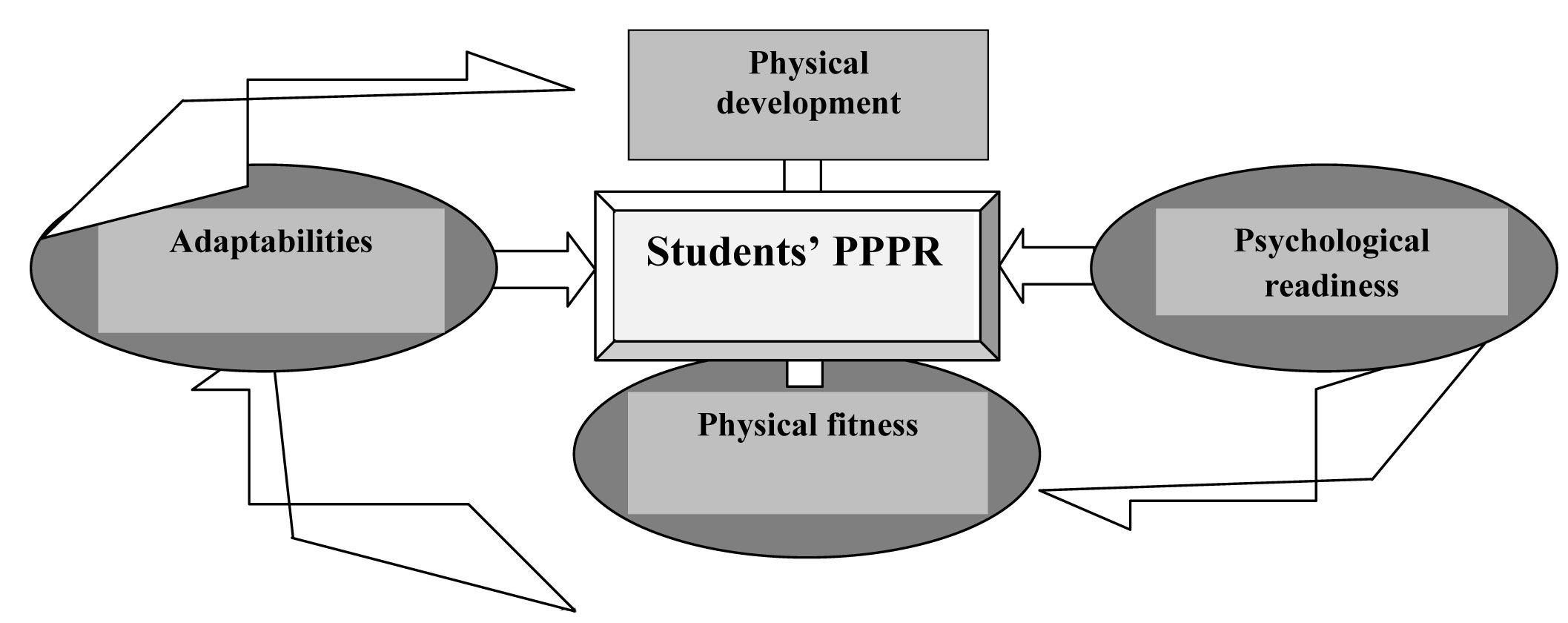Psychological and Physical Factors Influencing Development of Professionally Important Qualities of Students of Mining Faculties
Фотографии:
ˑ:
Yu.V. Yakovlev
N.V. Pakholkova, associate professor, Ph.D.
National Mineral Resources University “Mining”, St.Petersburg
J.A. Dotsenko, postgraduate
V.P. Semenenko, associate professor, Ph.D.
National university of physical education and sport of Ukraine, Kiev
Key words: students, engineers, professiogram, questionnaire, characteristics, working conditions, training.
Introduction. In order to make professional activity more efficient, the psychophysical preconditions and willingness to accelerate vocational training are to be created in future specialists so that they could work very effectively in the chosen profession, to prevent industrial diseases and injuries, ensure professional longevity, use of the methods of physical culture and sport for active rest and rehabilitation of all-round and professional working capacity, perform official and social functions on implementation of physical culture and sport in the professional collective [1].
Training of mining specialists requires considering their professional and psychophysical training. The training vector should not only be directed to acquiring professional knowledge during training of a future specialist, but also the foundation is to be laid for psychophysical training, which originates at physical education classes.
The purpose of the study was to examine the main psychological and physical factors affecting development of motor qualities of students of mining department.
Materials and methods: analysis and compilation of specialized literature data, advanced educational experience and observation, questionnaire, methods of mathematical statistics. A questionnaire survey of employees CJSC "DTEK-Roven'kiantratsit" (102 persons) and 3-4-year students of mining departments (97 persons) was conducted to study the specifics of labour of white-collar workers (WCW) and the requirements to professional activity and physical fitness of future specialists.
Results and discussion. The importance of human factors in the workplace increases with the development and complication of technology.
A specialist whose direct responsibility is to control the labor processes undergroud, always needs to display numerous mental qualities such as: observation, volume, distribution, switching, concentration of attention, long-term memory, operational thinking, mental endurance, emotional tolerance, strong will [3].
Proceeding from the analysis of the questionnaire data, the work of a mining specialist is distinguished by sufficiently high motor activity that needs overall and special endurance to be displayed.
In respect to the nature of work, free posture is the main working posture for 65.6 % of subjects, an uncomfortable pose is less common and peculiar for 34.4 % of respondents.
In this case there are the following working postures: standing - 48% of respondents, while walking; bending - 30% of respondents, when stripping workspace; sitting - 22% of respondents, setting description in the diary.
According to the findings, the main work processes of white-collar workers are ensured by the integrated nature of simultaneous hands and feet actions - 56% of respondents, mostly accompanied by leg movements - 24% and body - 20%.
The intensity of work of white-collar workers is noted by the substantial proportion of respondents: 32% of respondents feel very tired by the end of the working day, and 54% - by the end of the week.
The main signs of fatigue indicated by the respondents in the questionnaire are as follows: mood worsening - 90% of respondents, reduced arm, legs, back muscle strength - 74 %, increased irritability - 68%, distracted attention - 50%, negative chronotropism - 18%.
According to coalmen, the main causes of fatigue are: difficulty of manufacturing processes - 52% of respondents, complex mining-geological conditions - 21%, bad living conditions - 9%, disorganized diet - 7%, uncomfortable working posture - 7%, high working tempo - 4%.
A significant amount of colds, cardiovascular and respiratory diseases, gastrointestinal diseases is common for representatives of this profession.
Thanks to the comprehensive study of work and the survey of coalmen, a set of professionally important mental and physical qualities was revealed: overall endurance - 81 %, responsiveness - 67%, tolerance and attention concentration - 67%, visual memory - 49%, speed and accuracy of working movements - 48%, strength and strength endurance - 43%, attention allocation and switch - 35%, vestibular tolerance - 32%, operational thinking - 21% (Fig. 1).
The findings of the questionnaire of 3-4-year students of the mining department to identify professionally important mental and physical qualities were as follows: strength and strength endurance - 82 %, visual memory - 71%, speed and accuracy of working movements - 70 %, responsiveness - 60%, stability and concentration - 53 % overall endurance - 46%, vestibular stability - 28%, tolerance and attention switch - 22%, operational thinking - 9% (Fig. 1).

Fig. 1. A set of professionally important qualities in the students’ and miners’ opinion
The analysis of the results of the questionnaire of students and specialists, presented in Figure 1, has revealed some differences. In vocational training students give preference to development of strength and endurance (82% of respondents), speed and accuracy of performance of movements and visual memory (70 % and 71 % respectively). However, the major qualities for experienced specialists are overall endurance (82%), responsiveness (67%) and attention concentration (67%).
Based on the studies and the data of specialists [2, 4, 5] it has been found that professional psychophysical readiness (PPPR) is a combination of physical development, mental readiness, body adaptabilities to work under certain conditions.
A model of assessment of professional psychophysical readiness of students of mining departments was developed based on the findings (Fig. 2).

Fig. 2. The model of professional psychophysical readiness of students
To work effectively a future specialist should have the following professional psychological and physical qualities: intelligence, sharpness and depth of thought, good attention switch, motivation to effective work, communicative qualities, endurance, high motor coordination, responsiveness, etc. [1, 3].
Conclusions. According to our findings, high specific demands are being made to the psychophysical readiness of white-collar workers and students as one of the aspects of their future professional activity. There were identified the priority psychological and physical qualities necessary for effective work of a mining engineer and which should be implemented in the learning process on physical education of students of mining higher educational institutions.
References
- Pilipey, L.P. Applied professional physical training of students: monograph / L.P. Pilipey. – Sumi: DVNZ UABS NBU, 2009. – 312 P.
- Raevskiy, R.T. Applied professional physical training and psychophysical training of students of machine-building specializations: study guide for universities /R.T. Raevskiy, V.I . Filenkov. – Kramatorsk, 2003. – 100 P. (In Russian)
- Rudenko, G.V. Enhancement of the system of functional reserves of students' adaptation to professional career via physical culture: monograph / G.V. Rudenko. – St.Petersburg: [s.n.], 2012. – 160 P. (In Russian)
- Rudenko, G.V. Individualization of applied professional physical training of students of mining and geological specializations to activity related to risk to life and health: monograph / G.V. Rudenko. – St.Petersburg: Publ. h-se of SPbSPU, 2013. – 221 P. (In Russian)
- Sharopin, K.A. Information system of evaluation of students' psychophysical fitness for professional work: abstract of Ph.D. thesis / K.A. Sharopin. TPU Tomsk, 2007. – 27 P. (In Russian)
Author’s contacts: Panfilio@spmi.ru




